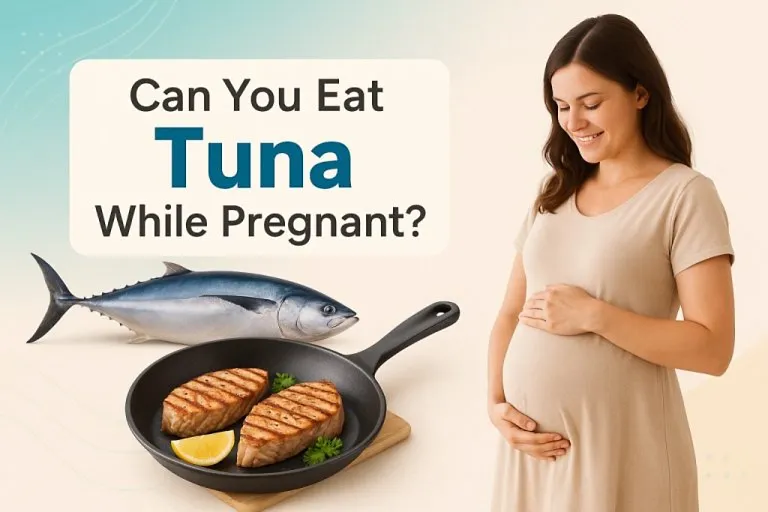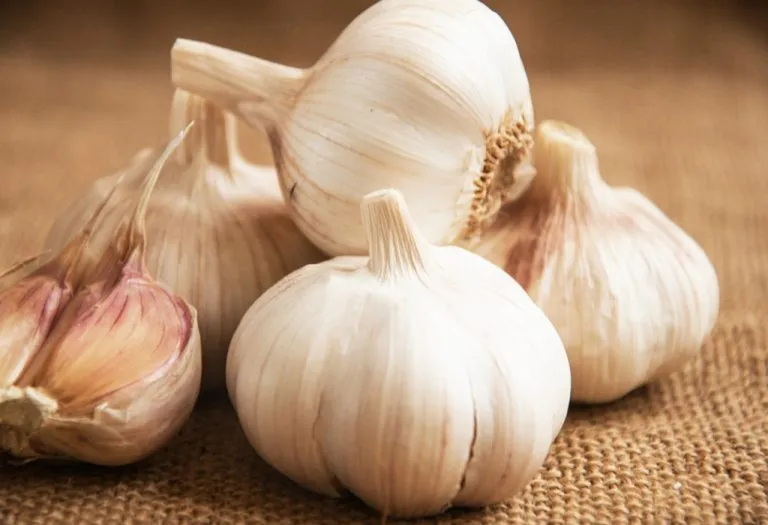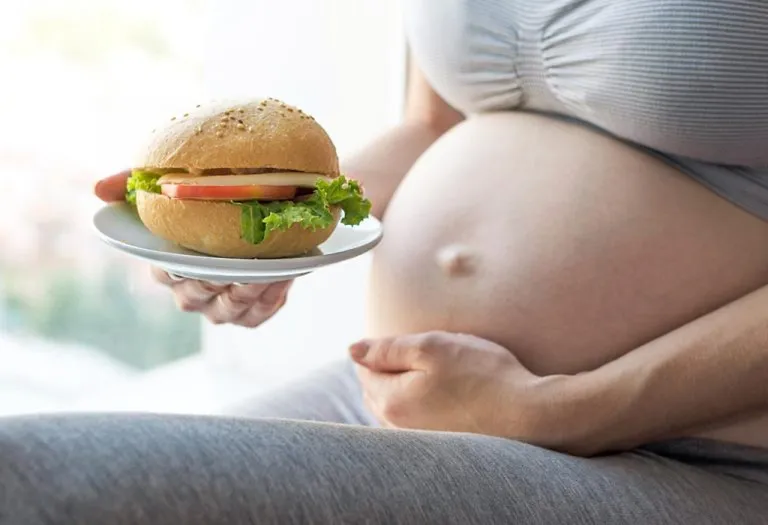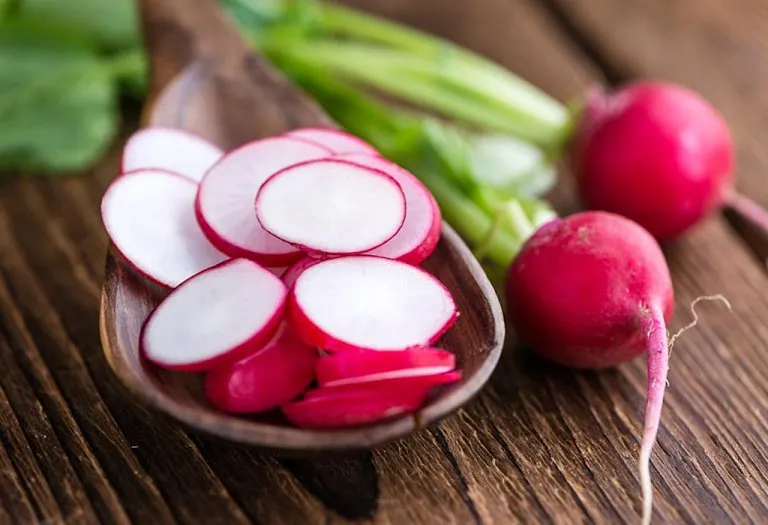Can You Eat Tuna During Pregnancy?

- Is It Safe to Eat Tuna While Pregnant?
- How Much Tuna Can You Eat While Pregnant?
- Benefits of Tuna in Pregnancy
- Risks of Eating Tuna While Pregnant
- Common Tuna Types and Their Eating Rules During Pregnancy
- Tips for Including Tuna in Your Pregnancy Diet
- Is Fresh Tuna Good for Pregnancy?
- Can You Eat Canned Tuna Fish While Pregnant?
- Tuna Types to Eat and Avoid
- FAQs
Giving birth to a child requires effort, and precautionary measures need to be taken right from conception. Whatever a pregnant woman consumes has to be checked for its nutritional importance and safety to the mother and her foetus. Tuna, for instance, is generally considered a great source of protein and omega-3 fatty acids, including eicosapentaenoic acid (EPA) and docosahexaenoic acid (DHA) content, both of which are monumental in the foetus’s brain and nervous system development (1). Nonetheless, tuna fish is also rich in mercury, which has proven harmful for the developing baby. This is the reason there are so many dilemmas related to tuna and pregnancy. So, is it safe to eat tuna while pregnant? Let’s find an answer to this and much more beneficial information.
Is It Safe to Eat Tuna While Pregnant?
During pregnancy, you need to be extra cautious of your food intake for your good health and the proper growth of your baby. If you are a seafood lover, you are certain to wonder, ‘Can pregnant women eat tuna?’ ‘Is tuna ok for pregnancy?’ The answer is yes. Tuna is a highly nutritious fish that needs to be consumed in moderation. Tuna that is low in mercury is safe for pregnant women, such as light tuna and white tuna (albacore).
However, pregnant women should be cautious of fish containing mercury. Therefore, they should consume only low-mercury fish and shellfish, including low-mercury tuna (2).
How Much Tuna Can You Eat While Pregnant?
The amount of tuna that you may consume must be adjusted based on whether you have any other seafood during the same week. As per the US FDA (Food and Drug Administration), pregnant and nursing women are allowed to have 8 to 12 oz of seafood, and specifically:
- 12 oz of light tuna a week (low in mercury)
- 6 oz of albacore tuna a week (high in mercury)
Benefits of Tuna in Pregnancy
There are numerous benefits of eating tuna in pregnancy. Some of the known ones are:
- Boosts your baby’s development by providing essential minerals like iron, Vitamin D, Vitamin B12, and omega-3.
- Tuna is a rich source of protein. A maternal diet rich in protein is essential for embryonic survival, growth, and development (3).
- The omega-3 fatty acids, including EPA and DHA, in tuna assist in the proper development of baby’s eyes, brain and nerves. These also help mitigate the health concerns of poor fetal growth, preterm birth, and maternal depression (4) (5) (6).
Risks of Eating Tuna While Pregnant
- Excess tuna builds up the mercury levels in your system, enters your bloodstream, and thus, affects the development of the brain and central nervous system (CNS) of the foetus (7).
- Mercury can lead to physical deformities, developmental delays, and weakened immune response (8).
- Mercury can also be a cause of heart damage.
- Tuna contains methylmercury (MeHg) and some environmental pollutants, dioxin,s and polychlorinated biphenyls (PCBs), which are toxic to health.
Common Tuna Types and Their Eating Rules During Pregnancy
Tunas come in different varieties, as listed below, and should be consumed in either broiled or baked form. Any uncooked or raw food may harbour bacteria, which can be harmful to your foetus. Make sure to cook your Tuna to a minimum temperature of 145 degrees Fahrenheit so that any potential parasites or pathogens in the tuna get killed.
- Albacore Tuna: White tuna is available in cans or pouches. It’s safe to have albacore tuna while pregnant, limited to 6 ounces or 2 medium-sized cans per week. You may consume it in the form of a tuna salad during pregnancy.
- Yellowfin Tuna: It is also known as light tuna and has a more profound flavour. Available in cans and pouches, yellowfin tuna during pregnancy should be cut down to 2 or 3 servings per week.
- Skipjack Tuna: Skipjack tuna has moderate levels of mercury. It is safe, but limit consumption to 1 or 2 servings a week.
- Ahi Tuna: Popular as bigeye, this tuna is available as sashimi or steak. It has high levels of mercury and, hence, should be limited to less than 6 ounces of serving a week.
- Bluefin Tuna: Bluefin Tuna is available in the form of sashimi and contains large amounts of mercury. It’s advisable to limit its intake to 6 oz a week.

Tips for Including Tuna in Your Pregnancy Diet
Eating tuna during pregnancy can be safe for both you and your baby when done correctly. However, a few safety measures can help you enjoy tuna without worry:
- Pick low-mercury options: Opt for canned light tuna, which has lower mercury levels compared to other varieties. Avoid high-mercury species like bigeye tuna.
- Eat in moderation: Keep your tuna intake within the suggested limits depending on the type you consume.
- Add variety: Mix up your seafood choices. Including other low-mercury fish ensures you get a broader mix of nutrients, rather than relying solely on tuna.
- Combine with vitamin C-rich foods: Eating tuna with foods rich in vitamin C, like oranges or bell peppers, helps your body absorb iron better and supports a strong immune system for both you and your baby.
- Follow local advice: If you’re buying freshly caught tuna, check local advisories for mercury levels to confirm it’s safe to eat.
- Skip raw tuna: Always eat canned or thoroughly cooked tuna. Raw or undercooked fish can lead to infections such as listeriosis or salmonellosis, which can be dangerous during pregnancy.
- Be mindful of contaminants: Fish can sometimes contain pollutants like mercury, pesticides, and microplastics. Opt for sustainably sourced tuna to lower your exposure risk.
- Stay hydrated and active: Drinking plenty of water and engaging in light exercise (with your doctor’s approval) can support your body in flushing out toxins.
- Watch for warning signs: If you notice any unusual symptoms, such as vision changes, loss of coordination, tingling sensations, or speech difficulties, stop eating fish and seek medical advice immediately.
- Pair with nutritious foods: A well-rounded pregnancy diet should include a mix of protein-rich and nutrient-dense foods such as eggs, beans, leafy greens, and whole grains, along with low-mercury fish.
Is Fresh Tuna Good for Pregnancy?
Fresh tuna feels oily, but it has the best nutritional values and is considered safe for pregnant women. It contains vitamins, minerals, and proteins, and is a rich source of omega-3 fatty acids. These help in the proper growth and development of the brain in the foetus.
Can You Eat Canned Tuna Fish While Pregnant?
Canned tuna is permissible for a pregnant woman as long as it is consumed in a limited amount. Regular consumption of canned tuna when pregnant has certain health risks to your growing foetus.
- The lining of metal cans contains the substance Bisphenol A (BPA), which may enter your system and affect foetal brain development (9).
- Canned tuna has salt that can cause a rise in the sodium levels in your body and increase the risk of high blood pressure.
Tuna Types to Eat and Avoid
If frozen tuna ok fro
Here, we provide a list of safe and unsafe tuna for pregnant women and nursing moms.
| Safety Level | Name of the Tuna Variety |
| Safe When Eaten in Moderation |
|
| Dangerous |
|
FAQs
1. Can you eat raw tuna while pregnant?
Raw tuna or any kind of fish harbours plenty of harmful pathogens and parasites. These harmful pathogens cause food-borne illnesses. Thus, it is only safe to eat thoroughly cooked tuna fish during pregnancy.
2. Is eating tuna sushi while pregnant safe?
Since pregnant women are advised to eat raw fish, they should also avoid sushi made with raw tuna.
3. What is the best way to prepare tuna for pregnancy?
Fish or shellfish in general should be thoroughly cooked to eliminate the presence of any pathogens. Cooking tuna to an internal temperature of 145°F will make it safe for consumption. Raw or cured seafood should be strictly avoided during pregnancy (10).
4. Can you eat tuna salad while pregnant?
Yes, you can consume tuna salad while pregnant when it is made from low-mercury tuna, which is thorougly cooked and is consumed in moderation (about 2–3 servings per week). Avoid eating raw tuna, as it may come with a host of illnesses, including Listeriosis. You can choose canned light tuna (skipjack) or canned white (albacore) tuna for making your tuna salad, while staying away from high mercury level tuna fish, like bigeye tuna.
In pregnancy, you need to be careful with your intake of seafood like tuna because high levels of mercury in the bloodstream of your foetus can be harmful to its brain and nervous system. Tuna is a nutritious fish and is beneficial for a pregnant woman only when taken in judicious amounts.
Also Read:
Eating Fish in Pregnancy
Eating Prawns During Pregnancy
Consuming Fish Oil During Pregnancy
Eating Shrimp While Pregnant
Consuming Crab During Pregnancy
Is Eating Sea Bass While Pregnant Safe?
Was This Article Helpful?
1. PubMed Central – Nutrition Recommendations in Pregnancy and Lactation
2. PubMed Central – Mercury exposure and children’s health
4. Cochrane Database of Systematic Reviews – Omega‐3 fatty acid addition during pregnancy
7. PubMed Central – Mercury in Children: Current State on Exposure through Human Biomonitoring Studies
10. FoodSafety.gov – People at Risk: Pregnant Women




































